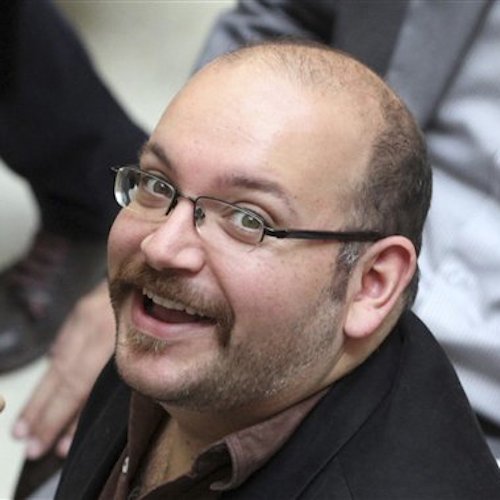Sign up for The Media Today, CJR’s daily newsletter.
Jason Rezaian appeared Monday in Iranian court, where he defended himself against espionage and other charges that could lead to 20 years in prison. The trial is closed — a request from The Washington Post to send a representative has not garnered a reply. The judge is a hardliner who has gained notoriety for imposing death sentences. The most minimum standards of due process have not been respected — Rezaian is being held largely incommunicado; he is interrogated without counsel, as he was again Monday; he receives inadequate medical care; and he was denied bail granted to other defendants (including his wife), who was arrested along with him.
But of all the stunning facts surrounding Rezaian’s imprisonment, the most disturbing is the most obvious: Rezaian is a correspondent for The Washington Post. Until fairly recently correspondents for major international media organizations — especially US outlets — held a status akin to diplomats. Repressive governments might bar them entry or expel them for the least infraction, but they wouldn’t jail them or physically mistreat them for fear of the negative impact such actions would have. In fact, Rezaian’s case is unprecedented. He has been jailed longer than any US correspondent, according to a detailed review of Committee to Protect Journalists records dating back to 1992.
International correspondents are a breed apart. When they were the dominant force of foreign reporting, this system concentrated power in a relatively small group of elite journalists who often moved in the same circles and echoed each other’s reporting. But it also had its benefits, because this group could use its privileged status to obtain access, go places, and say things that would be too dangerous for local journalists.
In some circumstances the untouchability of international correspondents increased safety for local reporters. When I was a freelancer in Mexico in the 1990s, local journalists would sometimes give away scoops to foreign correspondents because the information was too dangerous for them to publish in the domestic press. Once the news ran in the international media, local journalists could cite it without consequence, attributing to the foreign press the facts that they themselves unearthed.
International correspondents were also rarely targeted by violent forces within the societies they covered. Even many militant groups courted international journalists because the tightly controlled domestic media was closed to them. The international press was their only means of communicating with the public.
But the calculus changed dramatically with the kidnapping and execution of Wall Street Journal reporter Daniel Pearl in Pakistan in late 2001, and it has been reinforced by the recent executions of journalists in Syria.
The Rezaian case, and several others, show that repressive governments are recalibrating the benefits and consequences of jailing foreign journalists. Egypt imprisoned three Al Jazeera journalists for over a year on terrorism charges, for example, and two Swedish freelancers were jailed by Ethiopia after they were captured while embedded with separatist rebels.
Iran, of course, has not shied away from jailing international journalists, especially those like Rezaian who are dual Iranian nationals. Freelancer Roxana Saberi was jailed for several months in 2009, as was Newsweek correspondent Maziar Bahari, whose ordeal was documented in the Jon Stewart-directed movie Rosewater, released last year. (As is always the case, local journalists have it even worse. Around 30 journalists are currently jailed in Iran, according to CPJ research.)
Washington Post foreign editor Douglas Jehl told me by phone that what was once a shield for journalists has become a lure. “There was an operational assumption that the nature of journalism, and the benefit we provide as a tool for communication, would benefit all actors in a dispute and would convey insulation if not immunity. I began to reconsider those assumptions in the Jason case, and in Egypt, and with the executions in Syria. Journalists today are being targeted because they are journalists.”
Why are foreign governments more willing to jail international journalists? For the same reason that Islamic State is murdering them. It was their value as conduits to the global public that kept foreign correspondents safe. But the information revolution that has empowered average citizens has vastly diminished the power of this elite group. Today, there are many alternative ways to get your message to the world. Some governments are now willing to pay the price of jailing an international journalist in order to extract political concessions or suppress damaging information.
Rezaian’s case may be an example. Many Iranian analysts believe Rezaian’s imprisonment is being orchestrated by hardline elements in Iran so they can use his incarceration to scuttle any possible nuclear deal with which they disagree.
This possibility greatly complicates The Washington Post’s response, because campaigning could actually strengthen the hardliner’s gambit by making Rezaian more valuable as a “judicial hostage.” But to its credit, the Post has become increasingly direct and vocal in making the public case. “Iran is making a statement about its values in its disgraceful treatment of our colleague, and it can only horrify the world community,” noted Post Executive Editor Martin Baron in a recent statement.
For Rezaian’s sake, as well as for that of every single international correspondent working in dangerous conditions around the world, we should hope that the Post’s efforts succeed. Foreign correspondents once worried about stepping on a landmine or being expelled and today worry about being beheaded or jailed on charges of espionage. If that’s the risk, it’s our job to at least ensure that there will be some consequence for their mistreatment.
Has America ever needed a media defender more than now? Help us by joining CJR today.



